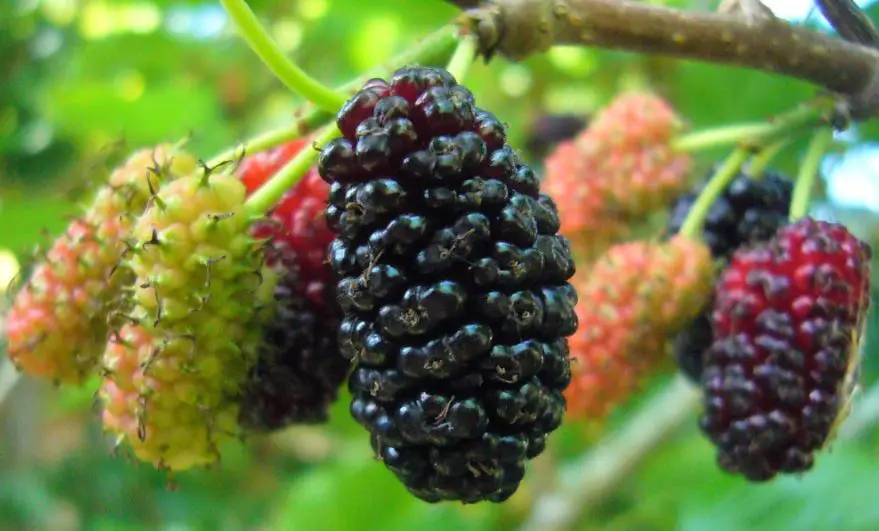Can Dogs Eat Mulberries
If you have a mulberry tree in your backyard, then you might notice that your dog is developing a taste for the ripe berries dropping on the ground. That might get you worried about your dog’s health, even when you haven’t seen any problems such as vomiting or diarrhea. Moreover, mulberries pop up almost everywhere in your backyard, making it hard to stop your canine friend from eating them.
Can Dogs Eat Mulberries
Mulberries are safe for your dog to eat when they are ripe and should be given in small amounts.
So, is it safe for dogs to eat mulberries?
People also ask, are mulberries edible? or are mulberries poisonous to dogs? Lets see…
Precise Answer:
 When ripe, mulberries are safe for your dog to eat but in small amounts. However, your furry friend can develop digestion issues after having too many. Additionally, unripe mulberries are not recommended for your pup as it will cause hallucinations and digestion issues.
When ripe, mulberries are safe for your dog to eat but in small amounts. However, your furry friend can develop digestion issues after having too many. Additionally, unripe mulberries are not recommended for your pup as it will cause hallucinations and digestion issues.
Just like other food substances, balance is the key when feeding mulberries to your dog. It might be a little hard to keep the dog away from the berries, so you need to ensure that the consumption is in small amounts.
You should also try to keep your pooch away from the fermented berries on the ground, as they can cause some dizziness and sometimes give the dog runny stool.
Nutritional Facts
Fresh mulberries are 80% water, with around 60 calories in every cup (140g). In this form, they contain 0.4% fat, 1.4% protein, 1.7% fiber and 9.8% carbs.

However, they can also be dried to increase their protein levels compared to most types of berries. When dried, they 3% fat, 12% protein, 14% fiber, and 70% carbs. Nonetheless, they offer a wide range of health benefits in both forms.
Benefits Of Giving Your Dog Mulberries
While not all berries are suitable for your pup, mulberries offer various health benefits to your pup. Here is why it’s healthy for your pooch to eat small portions of mulberries:
-
Enhance blood circulation
Mulberries have a high percentage of iron content that enhances the production of red blood cells in your dog’s body. In turn, these red blood cells improve the circulation of blood to ensure that oxygen reaches all the body cells and muscles.
-
Offers brain protection
Mulberries have a positive impact on the brain as they enhance the repair of brain cells. Research has proven that these berries also enhance cognition, giving your dog the ability to grasp tasks quickly, even the difficult ones. As such, they are great for your dog while undergoing training exercise.
-
Source of antioxidants
Antioxidants help to reduce the damage induced by free radicals, and the mulberries fruit is rich in them. Resveratrol is one of the main antioxidants in mulberries that has caught the attention of scientists and researchers. This antioxidant is known for its positive effects on aging and longevity in both humans and pets.
Research also suggests that mulberries can protect against oxidative stress, leading to an increase in your dog’s endurance. That’s mainly because the fruit contains anthocyanins that reduce physical fatigue and exercise-induced oxidative stress. That makes mulberries great for hunting dogs and other physically active pets.
-
Digestive health
The mulberry fruit is made of 25% soluble fiber and 75% insoluble fiber. Both soluble and insoluble fibers enhance your dog’s regular bowel movement, making digestion easier. That reduces the chances of your pooch developing indigestion and stomach upset issues. However, the fruits will cause complications if the dog over-feed, so be careful when allowing your mutt to eat mulberries.
-
Anti-obesity
While obesity is not common in active pets, most dog owners have a hard time dealing with the issue when it occurs. That mainly happens when your dog is over-nourished without the ability to exercise, making your dog unhealthy and overweight. That can result in serious health effects, including reduced lifespan and a weakened immune system.
Mulberry improves your dog’s ability to control the glucose level in the body and also reduces obesity-induced inflammation. Additionally, it reduces the fatty acids in your furry friend’s body, helping in reducing body weight.
-
Maintain blood vessel health
For blood to circulate properly in the body, healthy blood vessels are a must. The high levels of resveratrol in mulberries enhance the production of nitric oxide, which is essential in maintaining healthy vessels. Nitric oxide keeps your dog’s blood vessels relaxed, making it easy for blood to flow effectively.
-
Anti-tumor
While gastrointestinal tract cancers are not very common in dogs, they can affect any dog above six years. The most common symptoms include loss of appetite, weight loss, vomiting, and black colored stool. However, the anthocyanins found in mulberry fruits have been known to help in preventing the formation of tumors, which may prolong your dog’s life.
-
Build healthy bones
With calcium, iron, vitamin K, and traces of magnesium and phosphorus, mulberries are beneficial for creating and maintaining bone tissue. Strong bones are essential for physical activities and speeding up your dog’s healing process when hurt. Moreover, mulberries also help in reversing the damage caused by bone degradation, helping to prevent bone related disorders such as osteoporosis.
Do Mulberries Expose Your Dog To Any Adverse Effects?
Due to limited research on the effects of mulberries in dogs, it’s hard to assess the safety in all breeds of dogs accurately. However, there is sufficient evidence that mulberries are healthy for your pooch as long as it’s fed in moderation. Additionally, the berries might cause an allergic reaction in sensitive dogs, though that’s rare.
If your pooch is sensitive from the mulberry tree pollen, then he/she might also be sensitive to the fruits due to cross-reactivity. However, if you still want to try giving your furry friend the mulberry fruits, keep your vet on speed dial in case anything happens.
Recap
So there you go, answers to the questions can dogs eat mulberries and are mulberries poisonous to dogs? If your dog likes to eat mulberries, then there’s no need to worry as they are among the healthiest berries for dogs. However, it’s important to note that eating too much will develop digestion issues for your furry companion. Additionally, you need to make sure the pup is only eating the ripe mulberries to avoid hallucinations. In case of an allergic reaction, visit your vet immediately for proper diagnosis.






















My dog LOVES mulberries and has enjoyed them every season for years, however, this year the environmental conditions produced a tremorgenic mycotoxin on the rotten berries on the ground, and caused seizures. It took some time and research for us to figure out the cause. So, beware!